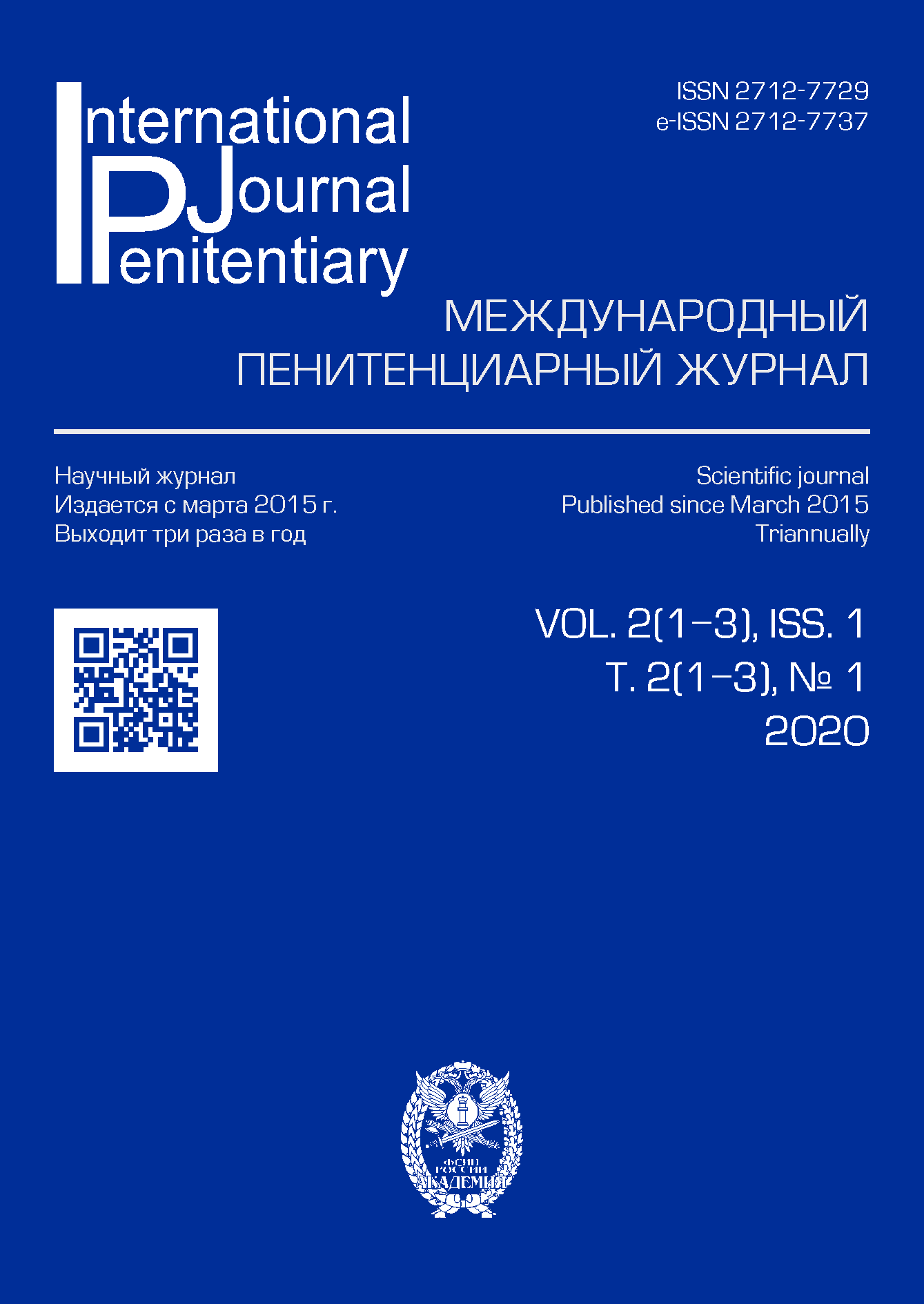Minsk, Belarus
CSCSTI 10.83
The article presents the concept of readiness of the convict’s personality for a law-abiding lifestyle, the provisions of which provide theoretical grounds for diagnosing such readiness and determining the system of psychological and pedagogical tasks for its formation in the correctional process. The concept provides a general understanding and the main components of the personality’s readiness for a law-abiding lifestyle; the spheres of life activity, in relation to which it should be formed; a system of psychological properties that form it, that are essential in determining law-abiding behavior and lifestyle in general. The author comes to the conclusion that the readiness of the convicted person to a law-abiding lifestyle is a system of psychological characteristics of the person, which act as internal prerequisites for the implementation of socially adapted life activities, preventing illegal acts. It is possible to distinguish three main components: 1) motivational-volitional attitude to lead a law-abiding lifestyle, which is the presence of desires to establish such a lifestyle, combined with volitional attitudes to implement them, observing self-discipline; 2) preparation for the legitimate solution of life’s problems, ensuring the satisfaction of their needs and legitimate interests as a system of evaluation and guidance ideas, labor and social knowledge, skills and abilities; 3) anti-criminal stability, which expresses the rejection of illegal ways of action and the ability to resist criminal influences and circumstances. The main areas of life, in relation to which it is necessary to form a readiness to act lawfully and be socially adapted, are: the sphere of material support of life; the sphere of interaction with other people; the sphere of performance of legally established duties; the sphere of leisure and entertainment. In relation to each area, it is necessary to form not only readiness for law-abiding behavior and solving life’s problems in a legal way, but also stability against committing illegal and deviant acts that carry the risk of committing such acts. The psychological essence of the convict’s readiness for a law-abiding lifestyle is a system of psychological characteristics of the personality that are essential in determining law-abiding life in conditions of freedom.
readiness of the convicted person for a law-abiding lifestyle, personality of the convict, correction of convicts, psychological properties of the convict’s personality, social readaptation of convicts, evaluation of the results of convicts’ correction, psychological and pedagogical tasks in convicts’ correction.
1. Pastushenya, A. N. 2003, ‘Formation of the convict’s readiness for a law-abiding lifestyle as the goal of the correctional process’, in Socio-psychological rehabilitation of convicts: effective models of work: materials of the International scientific and practical conference, pp. 3-12, National Institute of Higher Education, Minsk.
2. Gernet, M. N. 1930, In prison: sketches of prison psychology, 2nd edn, Legal publishing house of Ukraine, Kharkiv.
3. Poznyshev, S. V. 2011, Essays on prison science, Regional civil initiative - right to life and civic dignity, Moscow.
4. Glotochkin, A. D. & Pirozhkov, V. F. 1974, Correctional labor psychology, K. K. Platonov (ed.), Academy of the Ministry of Internal Affairs of the USSR, Moscow.
5. Glotochkin, A. D., Igoshev, K. E. & Platonov, K. K. 1985, Correctional labor psychology, Ryazan Higher School of the MIA of the USSR, Ryazan.
6. Ushatikov, A. I. & Kazak, B. B. 2001, The foundations of the prison psychology, S. N. Ponomarev (ed.), Academy of law and management of the Ministry of Justice of Russia, Ryazan.
7. Pozdnyakov, V. M. 2000, Domestic penitentiary psychology: history and modernity, Academy of management of the MIA of Russia, Moscow.
8. Stukanov, V. G. 2014, Correctional psychocorrection of the criminal’s personality, Academy of the MIA of the Republic of Belarus, Minsk.
9. Pastushenya, A. N. 1998, Criminogenic essence of the criminal’s personality: methodology of cognition and psychological concept, Academy of the MIA of the Republic of Belarus, Minsk.
10. Rubinshteyn, S. L. 2003, Being and consciousness. Man and the world, Piter, St. Petersburg.
11. Bandura, A. 2000, Theory of social learning, Evrasia, St. Petersburg.
12. Leont’ev, A. N. 2005, Activity. Consciousness. Personality, Smysl, Moscow, Academy, St. Petersburg.
13. Lomov, B. F. 1989, ‘System approach and the problem of determinism in psychology’, Psychological journal, iss. 4, pp. 19-33.
14. Anan’ev, B. G. 2001, Man as an object of knowledge, Piter, St. Petersburg.
15. Petrovskiy, A. V. & Yaroshevskiy, M. G. 1998, The foundations of theoretical psychology, INFRA-M, Moscow.
16. Brushlinskiy, A. V. 2003, Subject psychology, V. V. Znakov (ed.), Aletheia, Moscow, St. Petersburg.
17. Asmolov, A. G. 2001, Personality psychology: principles of general psychological analysis, Smysl, Moscow.
18. Lomov, B. F. 2006, Mental regulation of activity. Selected works, Institute of psychology of the Russian Academy of Sciences, Moscow.
19. Ponomarev, Ya. A. 1983, Methodological introduction to psychology, Science, Moscow.
20. Pastushenya, A. N. 2010, ‘Levels of mental regulation of an individual’s social behavior and their consideration in the psychological analysis of a crime’, Bulletin of the Academy of the MIA of the Republic of Belarus, iss. 2(20), pp. 152-156.
21. Kudryavtsev, V. N. 1998, The genesis of the crime. Experience in criminological modeling, INFRA-M, Forum, Moscow.
22. Poznyshev, S. V. 2010, Criminal psychology. Criminal types, INFRA-M, Moscow.
23. Ratinov, A. R. 1979, ‘Psychology of the criminal’s personality. Value-normative approach’, in Criminal personality as an object of psychological research: collection of scientific works of the all-Union Institute for the study of causes and development of crime prevention measures, pp. 3-33, All-Union Institute for the study of causes and development of crime prevention measures, Moscow.
24. Pastushenya, A. N. 2013, ‘Anti-criminal stability of the individual: structural and content aspect’, Applied legal psychology, iss. 2, pp. 31-40.
25. Heckhausen, X. 2003, Motivation and activities, 2nd edn, Piter, St. Petersburg, Smysl, Moscow.













